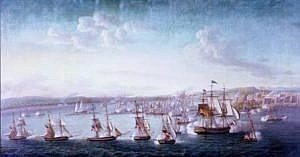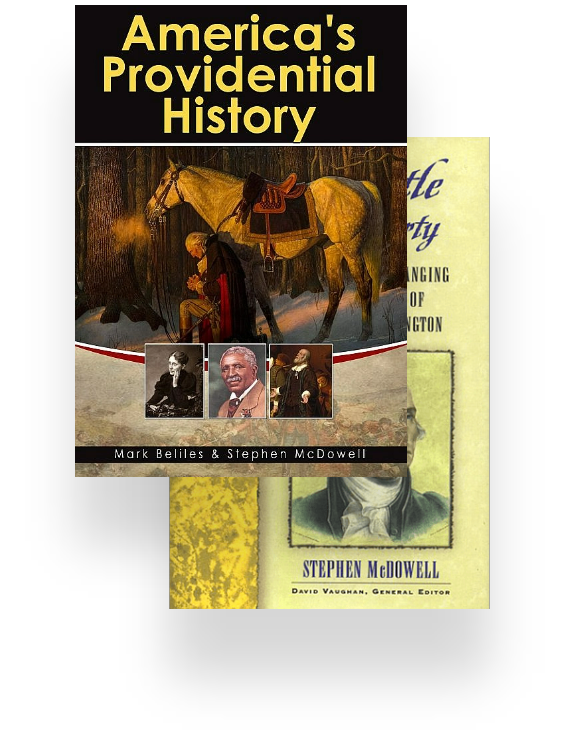PF UNIVERSITY

For PDF Version: America’s First War against Muslim Terrorists
By Stephen McDowell
America’s war with Muslim terrorists did not begin after the bombing of the Twin Towers in New York City on September 11, 2001. Nor did it begin with the bombing of the Beirut Barracks in Lebanon in 1983. In fact, the first war we fought as a new nation was against Islamic terrorists.

Muslims have long been at war with Christendom, on and off for fourteen centuries. By the late eighteenth century a “peaceful warfare” had developed. To carry on commerce within the Mediterranean Sea without fear of molestation from the Muslims, it was the custom for European powers to pay tribute to the pirates of the Barbary States (Algiers, Morocco, Tripoli, and Tunis). These states were located in North Africa, which the Muslims had controlled for centuries. European nations found it easier to pay the bribes than fight. Thus the unholy alliance of the Muslim states with nations like England, France, and Spain only served to build up the terrorists. The economic system of tribute, ransom, and bribery was well established when America entered onto the scene.
After American independence, American crews and ships came under the direct threat of the pirates as they began to sail under a new flag. The pirates saw the opportunity for fresh booty in ships and slaves. The U.S. Ambassadors to France, Thomas Jefferson, and Britain, John Adams, were ordered to do what they could to make peace. Jefferson argued the best long-term solution was to establish a navy, writing, “I very early thought it would be best to effect a peace through the medium of war.”[1] He pointed out that the cost of establishing and maintaining a navy “would amount to little more than we must pay, if we buy peace,”[2] that is, pay the tribute demanded by the pirates.
In May 1786, Jefferson and Adams met in London with the resident Tripolitan ambassador, Sidi Haji Abdul Rahman Adja, to try and negotiate a treaty to end the threat from the Barbary pirates. They asked the ambassador why the Muslim states were so hostile to the new American republic that had done nothing to provoke such animosity. Ambassador Adja answered, “that it was founded on the Laws of their Prophet, that it was written in their Koran, that all nations who should not have acknowledged their authority were sinners, that it was their right and duty to make war upon them wherever they could be found, and to make slaves of all they could take as Prisoners, and that every Musselman who should be slain in Battle was sure to go to Paradise.”[3] (Jefferson would later buy a Koran to learn for himself if it really taught this strange doctrine.)
With no means of resistance, the United States concluded a treaty in 1786 with the ruler of Morocco where the U.S. would pay money and give presents in exchange for captive Americans and future immunity. This treaty still applied in 1789 when the new U.S. Constitution went into effect. Paying tribute had been going on for centuries. Great Britain made a treaty with the Barbary States in 1662 to purchase immunity for its merchant shipping.[4] Having no other option, since the newly founded United States had no navy, President Washington continued the custom of paying tribute. This irked him greatly, but this was the only way to protect American commerce and American citizens from capture and imprisonment. Without the tribute payment, and at times with it, the pirates would capture ships and hold the captains and crew for ransom. They were held in horrid conditions, and many died from hardships of captivity.
Under Washington, funds had been appropriated to build a navy. Adams had access to these ships but did not think the American people were prepared for a protracted war in far off northern Africa, so he continued paying tribute. When Jefferson became President, he had had enough. He decided to use our treasury, not, in the words of the U.S. Consul to Tunis William Eaton, “to buy oil of roses to perfume that pirate’s beard,” but rather to send “gun batteries to chastise his temerity.”[5] When Jefferson refused to pay tribute to the Barbary pirates, they declared war of sorts upon the United States and began to attack American ships in the area, stealing property and imprisoning citizens. Jefferson sent troops to protect American interests. War continued until 1805 when a treaty of peace was signed on June 10 where the Barbary pirates agreed to end hostilities.
In 1815, while America was fighting the War of 1812, the leader of the Muslim terrorists in Algiers (having the title, the Dey) renewed his plunder of American commerce thinking the war would keep the U.S. from being able to respond. After pirates seized American vessels and citizens, Congress approved action against the Barbary powers. Capt. Stephen Decatur sailed from New York with 10 ships and captured enemy ships and sailed into the harbor of Algiers. He forced the Dey to release all prisoners without ransom and to agree to a peace treaty where no tribute would be paid again, nor American commerce molested. Decatur obtained similar guarantees from Tunis (July 26) and Tripoli (August 5).
America set an example for Europe of chastising and humbling a lawless band of pirates and ended the practice of paying tribute to Muslim terrorists. Expressions of submission were obtained from these powers by the United States such as had not been obtained by any other nation. Pope Pius VII declared that the Americans had done more for Christendom against the pirates of Africa than all the powers of Europe united.[6]
[This article is from the book Restoring America as the Land of Liberty by Stephen McDowell. The book or entire course can be ordered from the Providence Foundation store.]
[1] The Writings of Thomas Jefferson, Andrew A. Lipscomb and Albert Ellery Bergh, Editors, Washington, DC: The Thomas Jefferson Memorial Association, 1903, 5:364.
[2] Ibid., 5:366.
[3] Joshua E. London, Victory in Tripoli, How America’s War with the Barbary Pirates Established the U.S. Navy and Built a Nation, Hoboken, NJ: John Wiley & Sons, Inc., 2005, p. 23-24.
[4] Ibid., p. 25.
[5] Ibid., p. 11.
[6] Benson J. Lossing, Our Country, A Household History, Vol. 2, New York: Johnson & Miles, 1877, p. 1179.
PF UNIVERSITY
The courses offered by the Providence Foundation Biblical Worldview University (BWU) are designed to equip leaders of education, business, and politics to transform their culture for Christ, and to train all citizens how to disciple nations.
DONATE
Support Providence Foundation today! Choose Minuteman, Patriot, or Founder level and make a monthly impact. Or select ‘Custom’ to contribute now. Join us in shaping our nation’s future
